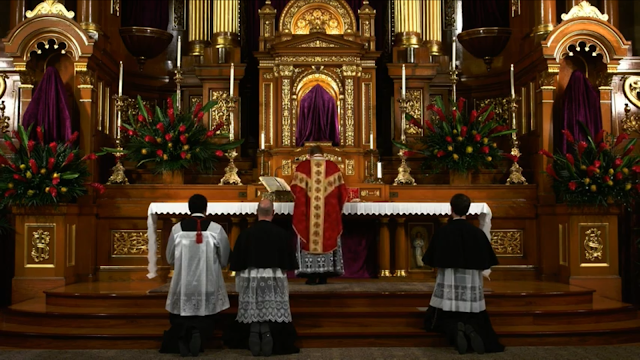Corona Wisse
Yesterday, everyone in the city of Chicago was warned not to go outside our homes except for necessities, on pain of arrest.
Today, I watched Palm Sunday Mass live-streamed from the church of St. John Cantius downtown.
Tomorrow, I will be teaching my first class of the Spring 2020 quarter online.
I still can’t decide how I feel about all of this.
Some worry that we are losing our freedom, not to mention our economy. Others insist that it is necessary to quarantine ourselves lest we—or our loved ones—lose our lives. Still others reassure us that, while things may or may not be as dire as they seem, there is a plan at work, we just need to stay home, let it play out, and all will be well.
If only there were a guide.
The message from the city was terrifying. It arrived on our phones with a siren’s blare, and it both threatened and shamed us if we dared ignore.
The Mass was exquisite, a glimpse of the worship offered Our Lord in heaven, with heavenly voices singing his praises with great beauty and love.
My students and I did a practice Zoom session last week, during which they read favorite passages from the stories we will be talking about this term. I am excited to be teaching in this new format, even as I know it will present challenges I have not anticipated, as much as the University has tried to help us make the transition online.
It cannot be real. It is the most real thing that has happened in my lifetime—and that is counting the fall of the Berlin Wall and 9/11.
More people in the United States have already died of complications from the coronavirus than died in the terrorist attacks on September 11, 2001. Over 1.2 million people are confirmed to have contracted the virus in the world.
It is like nothing the world has ever experienced. It is as familiar as the history I study everyday.
How does one live in such a time?
The first week or so after the United States closed its doors to the world, I found it hard to keep any schedule at all. Surely, the news from Italy was exaggerated. Surely, China had gotten the virus under control.
Day after day, as the hot flashes came and went, I checked myself for fever, testing my lungs by holding my breath. It was insane. It was practical. There was little chance I had been exposed. The whole world was going under lockdown.
When the University announced that we would be going remote for Spring, I joked on my social media about being ready for it.
I did not believe it when I went to Mass the next day and found the doors of the church closed.
It was like being in the midst of a great adventure—and yet nobody was allowed to leave home.
What would survive of our old life once the lockdown ended? Would we value the things that we had taken for granted? Or would we realize that everything that had once seemed so important was but grass?
It was ordinary to be learning new technology in order to teach.
It was impossible to believe that we would not be back on campus the following week.
It was the greatest April Fool’s joke ever. It was the end of the world as we knew it. It was like we had died—and found ourselves in a whole new world.
We have all become anchorites, walled up in our homes, with only a squint through which to look out on the world.
Or the Mass.
Today was Palm Sunday, and the churches were empty, except for the priests and—at places like St. John Cantius—the monks or the canons.
But as of this evening, the livestreams that the canons of St. John Cantius posted of their three Masses this morning have gotten over 61k hits—with a usual subscription to the channel of only 5k.
Back in the Middle Ages, the laity only tended to receive communion “in the mouth” once a year at Easter. At other times, they received not by eating, but by seeing. They prayed with their eyes even as they sang with their mouths.
It is the reason for the elevation of the host. So that the faithful could see God at the moment of the consecration: “This is my body.”
No wonder the most famous anchorite of all was so convinced that “All shall be well, and all shall be well, and all manner of thing shall be well.”
Hint: It wasn’t because she had social media.
I know how I am spending this Holy Week. How about you?
For further reflection on the significance of the moment we are living in, see “Corona Virginis” and “A Prayer for Resurrection in the Time of Coronavirus.”



















It could be interesting seeing the lectures of some professors from some universities online for a change! Many professors may not want to make them public.
ReplyDeleteRobert
Very pleasant look at the current bizarre situation, Professor! Keep up the good work!
ReplyDelete